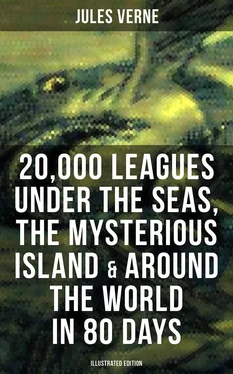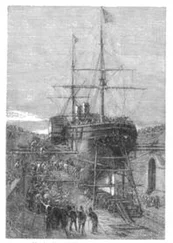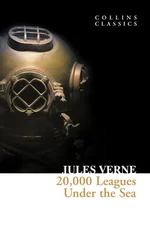“Quite so, Conseil, and what’s more, I imagine that people will soon be poking fun at us!”
“To be sure,” Conseil replied serenely, “I do think they’ll have fun at master’s expense. And must it be said … ?”
“It must be said, Conseil.”
“Well then, it will serve master right!”
“How true!”
“When one has the honor of being an expert as master is, one mustn’t lay himself open to—”
Conseil didn’t have time to complete the compliment. In the midst of the general silence, a voice became audible. It was Ned Land’s voice, and it shouted:
“Ahoy! There’s the thing in question, abreast of us to leeward!”
Table of Contents
AT THIS SHOUT the entire crew rushed toward the harpooner— commander, officers, mates,
sailors, cabin boys, down to engineers leaving their machinery and stokers neglecting their furnaces. The order was given to stop, and the frigate merely coasted.
By then the darkness was profound, and as good as the Canadian’s eyes were, I still wondered how he could see—and what he had seen. My heart was pounding fit to burst.
But Ned Land was not mistaken, and we all spotted the object his hand was indicating.
Two cable lengths off the Abraham Lincoln’s starboard quarter, the sea seemed to be lit up from underneath. This was no mere phosphorescent phenomenon, that much was unmistakable. Submerged some fathoms below the surface of the water, the monster gave off that very intense but inexplicable glow that several captains had mentioned in their reports. This magnificent radiance had to come from some force with a great illuminating capacity. The edge of its light swept over the sea in an immense, highly elongated oval, condensing at the center into a blazing core whose unbearable glow diminished by degrees outward.
“It’s only a cluster of phosphorescent particles!” exclaimed one of the officers.
“No, sir,” I answered with conviction. “Not even angel-wing clams or salps have ever given off such a powerful light. That glow is basically electric in nature. Besides … look, look! It’s shifting! It’s moving back and forth! It’s darting at us!”
A universal shout went up from the frigate.
“Quiet!” Commander Farragut said. “Helm hard to leeward! Reverse engines!”
Sailors rushed to the helm, engineers to their machinery. Under reverse steam immediately, the Abraham Lincoln beat to port, sweeping in a semicircle.
“Right your helm! Engines forward!” Commander Farragut called.
These orders were executed, and the frigate swiftly retreated from this core of light.
My mistake. It wanted to retreat, but the unearthly animal came at us with a speed double our own.
We gasped. More stunned than afraid, we stood mute and motionless. The animal caught up with us, played with us. It made a full circle around the frigate—then doing fourteen knots—and wrapped us in sheets of electricity that were like luminous dust. Then it retreated two or three miles, leaving a phosphorescent trail comparable to those swirls of steam that shoot behind the locomotive of an express train. Suddenly, all the way from the dark horizon where it had gone to gather momentum, the monster abruptly dashed toward the Abraham Lincoln with frightening speed, stopped sharply twenty feet from our side plates, and died out— not by diving under the water, since its glow did not recede gradually— but all at once, as if the source of this brilliant emanation had suddenly dried up. Then it reappeared on the other side of the ship, either by circling around us or by gliding under our hull. At any instant a collision could have occurred that would have been fatal to us.
Meanwhile I was astonished at the frigate’s maneuvers. It was fleeing, not fighting. Built to pursue, it was being pursued, and I commented on this to Commander Farragut. His face, ordinarily so emotionless, was stamped with indescribable astonishment.
“Professor Aronnax,” he answered me, “I don’t know what kind of fearsome creature I’m up against, and I don’t want my frigate running foolish risks in all this darkness. Besides, how should we attack this unknown creature, how should we defend ourselves against it? Let’s wait for daylight, and then we’ll play a different role.”
“You’ve no further doubts, commander, as to the nature of this animal?”
“No, sir, it’s apparently a gigantic narwhale, and an electric one to boot.”
“Maybe,” I added, “it’s no more approachable than an electric eel or an electric ray!”
“Right,” the commander replied. “And if it has their power to electrocute, it’s surely the most dreadful animal ever conceived by our Creator. That’s why I’ll keep on my guard, sir.”
The whole crew stayed on their feet all night long. No one even thought of sleeping. Unable to compete with the monster’s speed, the Abraham Lincoln slowed down and stayed at half steam. For its part, the narwhale mimicked the frigate, simply rode with the waves, and seemed determined not to forsake the field of battle.
However, near midnight it disappeared, or to use a more appropriate expression, “it went out,” like a huge glowworm. Had it fled from us? We were duty bound to fear so rather than hope so. But at 12:53 in the morning, a deafening hiss became audible, resembling the sound made by a waterspout expelled with tremendous intensity.
By then Commander Farragut, Ned Land, and I were on the afterdeck, peering eagerly into the profound gloom.
“Ned Land,” the commander asked, “you’ve often heard whales bellowing?”
“Often, sir, but never a whale like this, whose sighting earned me $2,000.00.”
“Correct, the prize is rightfully yours. But tell me, isn’t that the noise cetaceans make when they spurt water from their blowholes?”
“The very noise, sir, but this one’s way louder. So there can be no mistake. There’s definitely a whale lurking in our waters. With your permission, sir,” the harpooner added, “tomorrow at daybreak we’ll have words with it.”
“If it’s in a mood to listen to you, Mr. Land,” I replied in a tone far from convinced.
“Let me get within four harpoon lengths of it,” the Canadian shot back, “and it had better listen!”
“But to get near it,” the commander went on, “I’d have to put a whaleboat at your disposal?”
“Certainly, sir.”
“That would be gambling with the lives of my men.”
“And with my own!” the harpooner replied simply.
Near two o’clock in the morning, the core of light reappeared, no less intense, five miles to windward of the Abraham Lincoln. Despite the distance, despite the noise of wind and sea, we could distinctly hear the fearsome thrashings of the animal’s tail, and even its panting breath. Seemingly, the moment this enormous narwhale came up to breathe at the surface of the ocean, air was sucked into its lungs like steam into the huge cylinders of a 2,000-horsepower engine.
“Hmm!” I said to myself. “A cetacean as powerful as a whole cavalry regiment—now that’s a whale of a whale!”
We stayed on the alert until daylight, getting ready for action. Whaling gear was set up along the railings. Our chief officer loaded the blunderbusses, which can launch harpoons as far as a mile, and long duck guns with exploding bullets that can mortally wound even the most powerful animals. Ned Land was content to sharpen his harpoon, a dreadful weapon in his hands.
At six o’clock day began to break, and with the dawn’s early light, the narwhale’s electric glow disappeared. At seven o’clock the day was well along, but a very dense morning mist shrank the horizon, and our best spyglasses were unable to pierce it. The outcome: disappointment and anger.
Читать дальше












